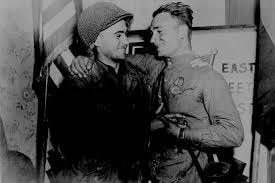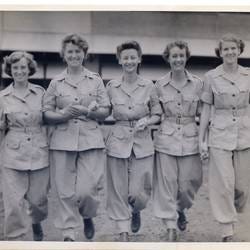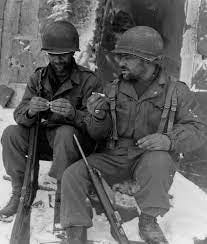World War Two is definitely one of the most popular wars ever. Countless movies have been made and books written about it, and even today, nearly eighty years after it finished, people are still talking about it. But when you take a look at WW2 from a 2022 perspective, there are elements of the war that are, to say the least, a little problematic. Here are ten things about World War 2 that really haven’t aged well at all:
The huge gender imbalance. The fact is that almost all the soldiers who fought in World War 2 were men: what women were involved were usually restricted to minor supporting roles. The picture gets even worse when you look at the upper echelons: not a single nation that fought in the war had a female leader. Back then this might have seemed normal, but with the benefit of hindsight it really does make the whole enterprise look pretty sexist.
Toxic masculinity. It wasn’t just that men outnumbered women in the war: it was also that the war itself reinforced a lot of the very worst stereotypes about masculinity. So many battles during the war sent the message that the only way to “be a man” was to be brave, not talk about your feelings, and kill other men. These are the attitudes that today we try our best to avoid instilling in our young men, yet during World War 2 such “macho” values were positively encouraged! Really on the nose.
Racism. OK, OK, it was a different time, but does that mean we give blatant racism a pass? Much of the conduct of World War 2 was marked with some really gross instances of racial discrimination. The leader of Germany, Adolf Hitler, was known for making numerous racist remarks in public, none of which he ever apologised for. Even worse, during the war in the Pacific, Allied troops were explicitly told to target certain races. Not cool, WW2.
Gratuitous violence. The glorification of violence is a major problem in our society, and it’s really sad to look back at the Second World War and realise how deep this problem goes. For almost all the six years of the war, hardly a day would go by without at least one act of really graphic violence, and all too rarely were these condemned by any figures in authority. In fact, many government figures and public role models went on record as endorsing violent acts during the war. You can’t help feeling that this was a terrible example to set and probably contributed to much of the trouble we have today with the same issue. Besides anything else, it betrays a dreadful lack of imagination on the part of the war’s makers, that they found it impossible to make their point without including the explicit violence.
Punching down. There’s a big difference between a war that punches up at those who wield power, and a war that punches down at historically marginalised groups. There can be little doubt that World War 2 was the latter.
The fashions. It always feels a little mean to make fun of people in the past for their clothes, but honestly, what were they THINKING?
Rampant ableism. You could never get away, nowadays, with a war that so openly and shamelessly discriminates against people with disabilities. And yet, throughout the war very few people with disabilities were allowed to participate fully. This is made all the more shameful by the fact that US President Franklin Roosevelt was himself disabled: yet he did next to nothing to ensure disability access to battlefields or troop transports. The lack of ramps on D-Day is only the tip of the iceberg. It really hammers home how things have changed - hopefully for the better!
Smoking. Back in the 1940s, smoking was much more normalised than it is now, but it’s still confronting to look at World War Two and see how many of the combatants have cigarettes dangling from their mouths. Some say that it’s a matter of personal choice, but when you’re in the public eye you do have a responsibility to be a role model, and frankly this ain’t cutting it.
The lack of a coherent political message. When it comes right down to it, what was World War Two ABOUT? The triumph of democracy over fascism? The triumph of Stalinism over fascism? Swing music? If you asked someone today, “what did the Second World War teach us?” they’d be hard-pressed to come up with a clear answer. Back then nobody really noticed, but today we expect a bit more from our wars.
Guns. In today’s world, where mass shootings are a growing problem, a war where guns are practically ubiquitous is simply irresponsible. At the time the use of guns in almost every major scene of the war seemed innocent, but with the wealth of research we have now into the impact of guns on society, it looks far less acceptable.




